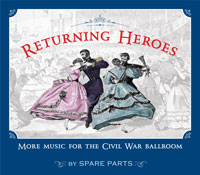 Brand new this month — the release party is coming up in a couple of weeks — is the dance band Spare Parts‘ latest CD of mid-nineteenth-century dance music, Returning Heroes. After dancing for many years to music from their earlier CD, The Civil War Ballroom, it’s a delight to have new music for this era!
Brand new this month — the release party is coming up in a couple of weeks — is the dance band Spare Parts‘ latest CD of mid-nineteenth-century dance music, Returning Heroes. After dancing for many years to music from their earlier CD, The Civil War Ballroom, it’s a delight to have new music for this era!
The short review: it’s a great CD; buy it immediately if you enjoy dancing of the Civil War era.
The longer version follows.
Disclaimer: the musicians of Spare Parts are personal friends, and my advance copy of this CD was sent to me as a gift.
The new music this CD provides:
- Two polkas and two waltzes.
- Other couple dances: one each of galop, schottische, mazurka, redowa, and polka mazurka.
- A new set of tunes for the first set of French quadrilles.
- Medleys for a single-figure quadrille, a polka contra, and a jig-time contra dance
- Long medleys for a Grand March and the Virginia Reel
All the music is taken from mid-nineteenth-century sources and is played primarily by a trio of piano-flute-violin, with some tracks also including bass, mandolin, and banjo. There are good liner notes that give the source of each tune, a bit of background, and the repeat structures for the tracks for which such information is useful (quadrilles, contras, etc.) That last is extremely helpful in saving me from sitting around listening to tracks and counting repeats. More extensive notes can be found on the Spare Parts website.
Some comments on the individual tracks:
The waltzes are both quite slow, 126 and 131 beats per minute respectively. This is somewhat slower than I would generally prefer for a mid-century waltz. One, “La Cachucha”, shares its name with a nineteenth-century solo dance that I’ve never reconstructed; this may be its name tune. The structure recorded here (8b + 32bx4) would also work nicely for a waltz quadrille figure.
The two polkas, are likewise fairly gentle in tempo (101 and 104 bpm) and very good tunes.
The galop, “The Wrecker’s Daughter”, is an amazing tune that I can’t wait to dance to.
The new quadrille set, “The Rats”, is also a great set of tunes, and it’s wonderful to have any new tunes for the mid-century quadrille, but I can foresee a problem here. The pieces are arranged in the lengths needed for the standard quadrille set (The Quadrille, Plain Quadrille, French Quadrille, etc.), but dance musician/author Elias Howe also set his own figures to them, which this recording will not fit. The liner notes do not make it clear that it is structured for the first set rather than Howe’s “Rats” figures, which is going to cause confusion/irritation when people try to use them for the latter.
(Updated 7/23/2012 to add: yes, this did turn out to be an issue. After getting requests for a good reconstruction of Elias Howe’s figures for “Rats”, I published a trio of posts on them, starting here.)
The redowa and polka mazurka recordings are very welcome, but both are played rather slowly (133 and 127 bpm) relative to the 144 bpm I see recommended in later nineteenth-century dance manuals. It’s easier to dance them at the slower tempo, but I’m not sure how accurate it is.
The mazurka is also slower than is typically danced at balls, but I actually welcome that, since I think the mazurka is commonly danced at much too fast a tempo. The recording too short for a genuine mazurka (a series of improvised figures led by one couple of a set), but it would work for a mazurka waltz or perhaps a single figure in a cotillion (series of dance mixers/party games).
The jig medley (“Jeff Davis’ Dream”) is another set of great tunes and is recorded with nine repeats, which works nicely for a duple minor contra for a four-couple set using the historical style of progression starting at the top of the set only, though the aforementioned Elias Howe also suggested that the simultaneous start customary nowadays was also a good approach. I’m not sure why the polka contra medley is recorded only eight times, though; that’s not good a good number for either the top-down start or the simultaneous start.
On a personal note, I was tickled to find “Oh, Susanna”, “Camptown Races”, and “Yellow Rose of Texas” lurking in the Grand March and Virginia Reel medleys. I learned all three while growing up in Texas, having no idea that they were nineteenth-century songs. It’s lovely to hear them played for dancing.
Returning Heroes can be ordered by mail from the Spare Parts website.


Leave a Reply